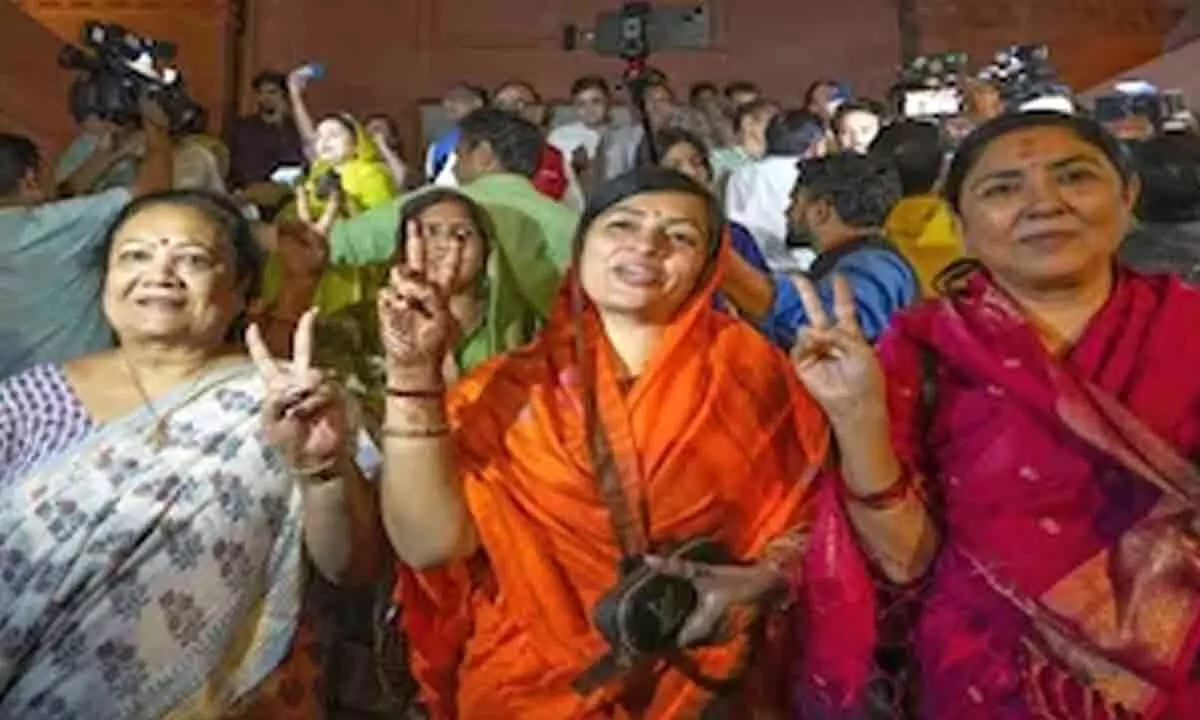Live
- Zimbabwean president calls for international support to resolve debt issues
- Judiciary Plays a Key Role in the Indian Constitution - Senior Civil Judge A. Sri Devi
- Karnataka BJP Stands Strong Against Waqf Board Misuse
- Keerthy Suresh in sultry avatar for Bollywood debut ‘Baby John’
- Ram Charan pre-look for ‘RC16’ sets internet on fire
- BBMP Accused Of Misappropriating ₹46,300 Crore In Public Funds
- Tensions Mount In Manipur As Missing Meitei Man Sparks Protests
- Allahabad High Court To Review Dual Citizenship Allegations Against Rahul Gandhi
- Tollywood mourns the loss of lyricist Kulasekhar
- Labourer's Mortal Remains Negligently Disposed Four Arrests Made Thus Far
Just In
Controversy Over Delimitation Sparks Concerns In Southern States Amid Women's Reservation Bill Passage


- 1. As the Women's Reservation Bill gains approval, the looming delimitation exercise based on population raises fears in southern Indian states.
- 2. This article explores the potential consequences of this exercise and the political implications for the region.
The approval of the Women’s Reservation Bill in Parliament has sparked renewed concerns among opposition parties in the southern states regarding an impending delimitation process. These concerns arise from the possibility that the delimitation of Lok Sabha seats, which is based on population, might result in reduced representation for the southern states. This outcome is seen as a consequence of their successful implementation of family planning programs, which has led to lower population growth.
During a discussion on the Women’s Reservation Bill in the Lok Sabha, DMK MP Kanimozhi expressed apprehension that if the delimitation were based on population census, it could diminish the representation of southern states, effectively hanging a potential threat over their heads.
The Women’s Reservation Bill, passed by the Lok Sabha, aims to provide 33% reservation for women in both Lok Sabha and state assemblies. However, this reservation will only take effect after the completion of the delimitation of Lok Sabha constituencies.
To carry out the delimitation process, the government must conduct the decennial Census, which has been postponed indefinitely since 2021 due to the Covid-19 pandemic.
If Lok Sabha seats are redistributed across states following the delimitation exercise, scheduled to take place after 2026, the combined result for Tamil Nadu and Kerala is expected to be a loss of 16 seats, as outlined in a research paper published by the Carnegie Endowment for International Peace prior to the 2019 Lok Sabha elections.
RSP MP N K Premachandran expressed his view that it is unjust for the northern states to gain more seats at the expense of the southern states. He emphasized that this fear is real, and the southern states could face a reduction in both seats and political representation. He also pointed out that the Constitution specifies that delimitation should be based on the 1971 census, and the southern states should not be penalized for their success in population control.
According to a research paper titled 'India’s Emerging Crisis of Representation' by policy analysts Milan Vaishnav and Jaimie Hintson, states in North India could gain over 32 seats, while the southern states may lose 24 seats in the redistribution. Bihar and Uttar Pradesh alone are projected to gain 21 seats, with UP's seat count increasing from 80 to 91, and Bihar gaining an additional 10 seats.
It's worth noting that the current strength of the Lok Sabha, with 543 seats, is based on the 1971 Census. Delimitation exercises were frozen by the 42nd amendment to the Constitution for 25 years, extending until 2001. This freeze was further extended for another 25 years, until 2026. As per Article 82 of the Constitution, only Census data post-2026 can be used for the delimitation process.

© 2024 Hyderabad Media House Limited/The Hans India. All rights reserved. Powered by hocalwire.com






